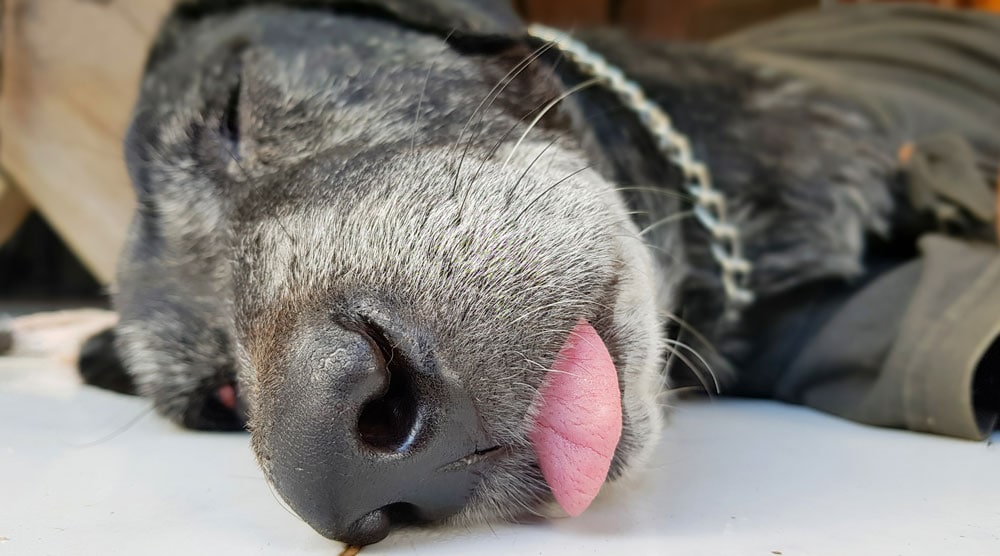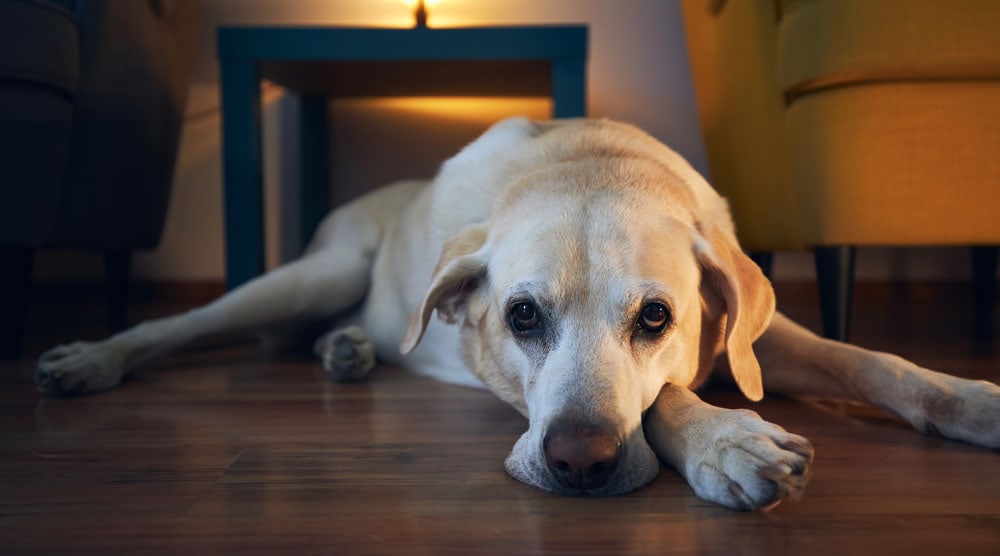Dogs aren’t shy about using their tongues! Whether they’re lapping up water, grooming themselves, or trying to lick your face, a dog’s tongue is often on display.
What can cause your dog’s tongue to hang out while sleeping though?
While this can seem like strange behaviour, it’s usually nothing to worry about. Many dogs sleep with their tongue out sometimes – especially when they feel relaxed and comfortable.
However, a dog sleeping with his tongue out could also indicate illness, pain, or overheating. Certain dog breeds are also more prone to a tongue that hangs out. Let’s take a closer look at some of the most common reasons for this behaviour.
Contents
Why Do Dogs Sleep With Their Tongue Out?

As we mentioned in the introduction, a dog sleeping with his tongue out is usually not a medical concern. But if you’re worried about your dog, or you notice other symptoms, then you should contact a vet to be safe.
1. Relaxation
The most common reason for a dog sleeping with his tongue out is relaxation!
Just like humans, dogs may sometimes sleep with their mouths open. This is most likely when the dog is fully relaxed and entering a deep sleep.
As the mouth opens, the tongue may fall out (depending on the position the dog is resting). The deeper the sleep, the more likely this is to happen.
2. Overheating
While relaxation is usually the cause of a dog sleeping with the tongue out, it’s not the only reason this can happen. Another possible explanation is that the dog is too hot.
Dogs cool themselves through panting. As they pant, moisture from the tongue and mouth evaporates, which reduces body temperature.
Sleeping with the tongue out is not the same as panting, but it can have a similar effect. It keeps the dog’s tongue in contact with cooler air and may help to regulate body temperature.
Keep in mind that dogs can’t sweat from most of their body. This makes thermoregulation more difficult, which is why the tongue is important for keeping cool.
Note: Panting at night, especially if the dog has not been recently active, can indicate a medical problem. For example, excessive panting is linked with dehydration, heat stroke, pain, or stress.
3. Tooth or Mouth Pain
Discomfort in the dog’s mouth can cause a dog to move their tongue to try to get comfortable. In some cases, this could lead to the tongue hanging out when the dog is sleeping.
Tooth or mouth pain is nearly always accompanied by other symptoms. Watch out for other warnings signs, such as:
- Loss of appetite
- Reluctance to drink
- Whimpering or other vocalisations
- Waking up throughout the night
- Pawing at the face
- Swollen or discoloured tongue
- Red or pale gums
Rotten teeth can also cause the tongue to hang out more often. This is because the teeth are no longer supporting the tongue inside the mouth.
Dental and mouth issues can cause serious pain. You should always contact a vet immediately if you notice any unusual symptoms.
4. Large Tongue Or Other Genetic Factors
There are several genetic factors that can make it more likely for a dog to sleep with its tongue out. These include:
- Tongue is too big for the mouth
- Jaw is misshapen (either due to genetics or injury)
- Front teeth are missing (making it easier for the tongue to slip out)
Certain breeds are more prone to these genetic variations. For example, boxers are more likely to have tongues that are too big for their mouth.
If your dog’s tongue is hanging out due to genetic factors, then there’s usually not much that can be done about it. However, it’s rare for it to cause serious medical problems.
5. Hanging Tongue Syndrome
Hanging tongue syndrome is a genetic condition that’s closely linked to the previous point. But with hanging tongue syndrome, the dog’s tongue is usually visible at all times.
This condition is often caused by a tongue that’s too large. It’s most common in brachycephalic breeds, such as bulldogs, cavalier king charles, and pugs.
These breeds often have short snouts, which can mean the tongue is too long to fit. An underbite can also mean that the tongue isn’t supported properly.
While hanging tongue syndrome can cause the dog to sleep with their tongue out, it’s usually not a dangerous medical issue. The tongue can dry out quickly though, so it’s important for the dog to have continuous access to water.
You should contact your vet if you notice the tongue thickening or swelling. It’s also vital to monitor the breathing of brachycephalic breeds and contact a vet if you notice signs of difficulty.
6. Illness or Injury
Some medical conditions or physical injuries can make it more likely for a dog’s tongue to hang out when sleeping. For example, nerve damage or mouth injuries may make it more difficult to control the tongue.
Canine cognitive disorder (CCD), which is sometimes called canine dementia, can also cause changes in sleeping behaviours.
Most medical conditions cause other symptoms, such as:
- Panting during sleep
- Swollen mouth or tongue
- Change in appetite
- A tongue that suddenly starts hanging out on a regular basis
- Behaviour change
- Excessive drooling
- Sore gums
- Pale or red gums
- Protecting the mouth
- Increased snoring
If you notice signs of illness, then you should always contact a vet immediately.
Should You See A Vet?

You should always contact a vet if you’re worried about your dog’s health. But it’s probably not worth worrying about a dog who occasionally sleeps with their tongue out – especially if they’ve always done it.
However, if there are other symptoms, or your dog has suddenly started hanging their tongue while sleeping, then it’s important to take them to a vet.
It’s a good idea to take a video of your dog sleeping to show them how the tongue hangs (along with any other symptoms). This can make it much easier for the vet to diagnose the issue.
What Might Cause A Senior Dog To Sleep With Their Tongue Out?

Any of the reasons mentioned above can cause a senior dog to sleep with their tongue out. Relaxation, overheating, pain, or hanging tongue syndrome can all cause this behaviour.
Some causes are more likely in senior dogs though. For example, canine cognitive dysfunction typically only affects older dogs. Gum disease and tooth decay are also more common in senior dogs.
Summary
A dog sleeping with the tongue out isn’t always a reason for concern. It’s often just a sign that your dog has slipped into a deep sleep, which shows they are relaxed and comfortable.
There are potential medical causes of this behaviour though. Overheating, mouth pain, and illness can all be a reason for the tongue hanging out. Some breeds are also more prone to this behaviour, due to the tongue being too large for the mouth.
Do you have any questions about why dogs sometimes sleep with their tongue out? Please let us know in the comments section below.



